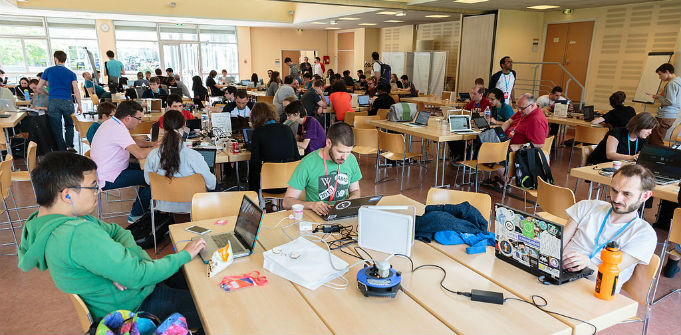


Picture a busy room with small teams hard at work in clusters throughout the space. There’s intense concentration, fierce but friendly debate, and decisions being made. Above it all, the clock is ticking.
Hacking has a bit of a bad name these days, but like any technical skill it can be used for good as well as evil. Good hacking is where we use data and computers in new and creative ways.
While “to hack” suggests breaking into a system without permission, it’s also a display of someone who has uncommon abilities and a creative approach to using computers in ways that were not originally envisaged.
A hackathon brings these skills to the fore, and puts them in a marathon. Participants come together in a simple space that provides network access, power outlets for laptops, and some basic equipment for brainstorming.
Time constraints are all part of it. Frequently taking place over two days, there’s a level of energy and enthusiasm that sees participants working long hours, with coffee and high GI foods consumed in abundance.
Many winning teams observe, though, that getting rest helps with clear thinking and team building. Past GovHack winner David Gregory says: “The best place to meet new people is during the meal breaks. I met lots of people from other teams and just chatted finding out a bit about them and it was a great social event as well as a productive hacking experience”.
Hackathons are a valuable initiative for many businesses. Large organisations frequently take time out these days to bring staff together for hackathons, investing not just employee time but real cash to fly in and accommodate people.
Read more: How to follow in the footsteps of Atlassian and Zendesk and run your own hackathon
Opportunities
In a corporate or small business environment, hackathons can encourage the creation of new business opportunities, leveraging the assets of the business that are unique to them.
Sometimes there is new data or application programming interfaces (APIs) available that might be hacked to produce fresh insights into the organisation.
Often there are new software tools available that staff are keen to try in a semi-real environment. Machine learning — a type of artificial intelligence that uses algorithms to make software applications smarter at predicting outcomes — is a recent example.
Public hackathons, like GovHack, often simply have the objective of leveraging open government data in the quest for a better democracy.
Worth running?
Travel and time away from normal work clearly costs money, but organisations choose to run hackathons because they pay back in important ways:
Develops relationships
Staff from different parts of the organisation meet and bond in an environment of respect and productive work. Friendships forged in the heat of a hackathon are particular enduring, and may lead to important new connections across silos in a company.
Encourages discipline of focus and attention
While formal training events frequently use group exercises to build teams, these can often feel contrived and ineffectual. Maintaining participants’ focus and commitment to the task can be a challenge also; it can be difficult to keep attention in the room. Hackathons succeed where training workshops fail.
Contributes to great workplace culture
Working under pressure in an interdisciplinary team is a wonderful source of “war stories”; both successes and misses, that add to the cultural glue that makes an organisation more of a family than just a workplace.
Worth competing?
If you have the opportunity to participate in a hackathon, take it. Time management, team organisation, data wrangling, user interface design, programming and presentation skills are all there for your professional development.
Hackathons are like a mini startup experience where failing fast is fine and participation is always positive.
This is part of a 12-part series into hackathons that SmartCompany is publishing in association with GovHack.


COMMENTS
SmartCompany is committed to hosting lively discussions. Help us keep the conversation useful, interesting and welcoming. We aim to publish comments quickly in the interest of promoting robust conversation, but we’re a small team and we deploy filters to protect against legal risk. Occasionally your comment may be held up while it is being reviewed, but we’re working as fast as we can to keep the conversation rolling.
The SmartCompany comment section is members-only content. Please subscribe to leave a comment.
The SmartCompany comment section is members-only content. Please login to leave a comment.